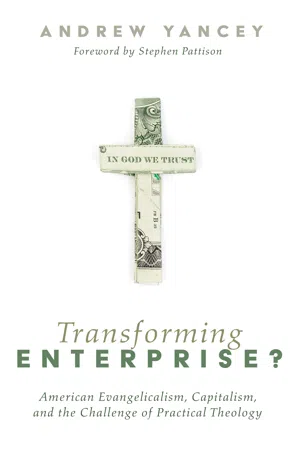![]()
1
What Practical Theological Method Is Being Utilized?
A recent edited volume with contributions from major American evangelical insiders contemplates the state of the movement after Donald Trump’s election to the American presidency in 2016. It starts bluntly: “Evangelicalism in America has cracked, split on the shoals of the 2016 presidential election and its aftermath, leaving many wondering whether they want to be in or out of the evangelical tribe.” The dynamic and uneven growth of capitalistic enterprise is at the heart of this splitting. A divided vote in American evangelicalism was symptomatic of growing racial tensions spurred by socioeconomic disruption across the country:
For contemporary American evangelical theology to renew a transformational vision of enterprise, it must confront these fractures. To do so will require a reframing of the relationship between religious belief and practice. Historically, American evangelical religion has emphasized individual belief systems and doctrinal propositions as the basis for forming and sustaining communities of faith. In short, that the right theological beliefs produce morally sound practice.
However, what the 2016 election exposed is that the complexities facing American evangelical efforts to integrate Christian faith and capitalistic enterprise are “more about social location than theology proper.” The strengthening of theological reflexivity—taking an evaluative stance toward its own beliefs and practices—requires American evangelicalism to interrogate not just its own theological propositions, but also how they are implicitly shaped by sociopolitical-economic contexts and manifested in embodied spiritual practices.
The dynamic growth of consumer capitalism makes this no easy undertaking. One of the markings of present-day consumer capitalism is the diffusion of consumer markets and ideology into non-market contexts (including Christian churches). The reach of instrumentalizing forces extends into daily consumer life, but subtly. To draw out these forces, consumer capitalism’s political and social power structures and how they shape religious practice must be analyzed.
These are questions germane to the discipline of practical theology and its distinguishing focus on the practice of Christian beliefs. In its relatively short history, the discipline of practical theology as broadened its focus of inquiry from primarily the practices of clerical ministry to how belief, tradition, and practice intersect complex human experience within the daily life of faith communities.
The purpose of this chapter is to provide a fuller framing of the book by locating myself within the diverse landscape of practical theology. I do this, first, by overviewing the discipline to show how it links together practice, ethics, and public theology. Key historical developments that created these links are highlighted, and then the contemporary state of the discipline is analyzed in terms of its core methodological framework and the four primary trajectories that express it. Second, I relate contemporary practical theological methodology to the strengthening of American evangelical reflexivity. Specifically, how the transforming praxis and neo-Aristotelian trajectories in contemporary practical theology can be applied to draw out the ways that evangelical spiritual practices have been affected by capitalism’s diffusion.
I proceed, first, by elaborating how consumer capitalism’s diffusion has shifted religious expression. Then, I show how the transforming praxis and neo-Aristotelian trajectories are best suited to draw out the effects of these shifts. Finally, I contend that these practical theological trajectories affirm a strengthening of theological reflexivity that functions not in isolation, but in interdisciplinary engagement with fields such as management ethics undergoing similar shifts.
Before proceeding, I should briefly elaborate on how I am using the term evangelical throughout this dissertation. The word evangelical transliterates εὐαγγέλιον, “good news” or “gospel.” Historically, it designates Protestants who emerged from the Reformation “strongly emphasizing the redeeming work of Christ, personally appropriated, and . . . spreading the good news of that message.”
I generally adopt this conventional usage, although it is important to note that evangelicalism has undergone significant demographic transition within the last century. According to World Christian Encyclopedia, over 90 percent of evangelicals were concentrated in Europe or North America in 1900, whereas today the number of evangelicals in Europe and North American is exceeded independently by those in Africa,...
